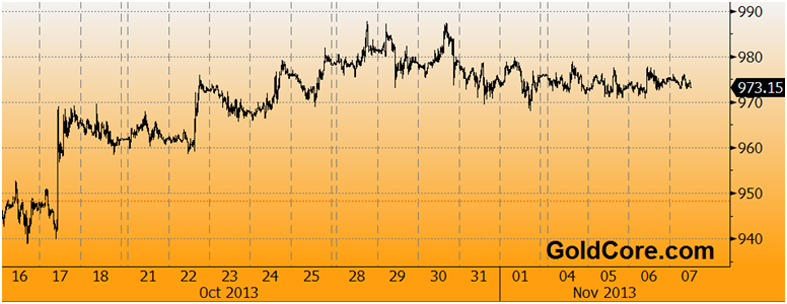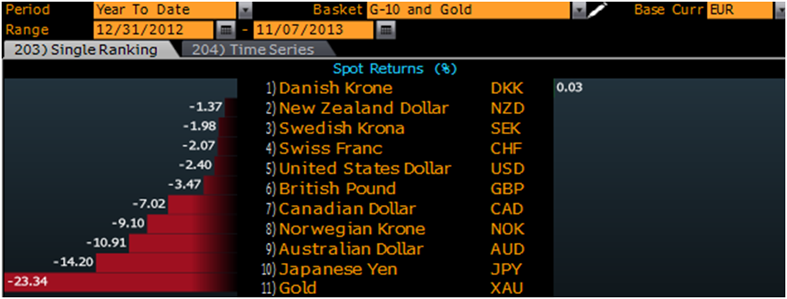Today’s AM fix was USD 1,316.00, EUR 973.45 and GBP 818.46 per ounce.
Yesterday’s AM fix was USD 1,317.00, EUR 975.05 and GBP 817.66 per ounce.
Gold climbed $6.40 or 0.49% yesterday, closing at $1,317.20/oz. Silver climbed $0.10 or 0.46% closing at $21.78. Platinum rose $13.25 or 0.9% to $1,460.99/oz, while palladium rose $13.50 or 1.8% to $751.50/oz.

Gold in Euros, 30 Day – (Bloomberg)
Today, all eyes are on the ECB rate decision. The ECB is expected to leave rates unchanged at 12:45 GMT (7:45 EDT), but may indicate that it will reduce rates soon which would be gold supportive, particularly in euro terms.
Gold in euro terms is down 23.4% year to date. It appears to be consolidating between EUR 900/oz, the low on June 28th and EUR 1,100/oz, gold’s high back in late May. A signal from the ECB that it is going to loosen monetary policies even further could be the spark that gold needs to help prices get momentum to the upside again.
There is increasing pressure on the ECB, particularly from the banking sector, to adopt the ultra loose monetary policies being pursued and experimented with by the Federal Reserve. Policies, incidentally, which have not succeeded in reviving the moribund U.S. economy.
This pressure and a lack of inflation today may lead the ECB to signal that they intend reducing interest rates from 0.5% soon. They may also consider adopting even more radical monetary policies involving quantitative easing (QE) or the creation of euros in order to buy or monetise government debt as the U.S. is doing with their $85 billion a month bond buying programme.
An even more radical option of negative deposit rates is also being considered. There are suggestions that the ECB is considering charging banks for depositing their reserves with the ECB by imposing a negative deposit rate.
Many banks would then pass on this negative rate to depositors meaning that extremely low yielding deposit instruments could become negative and actually cost depositors money.

Gold in Euros, 3 Year – (Bloomberg)
Expectations the ECB would cut its 0.5 refinancing rate rose last week after official figures showed a fall in euro zone inflation. Citizens in most European nations would likely question the figures as the real world experience of people in most European countries is of rising prices.
Draghi’s news conference, when he may prepare the ground for a cut in December, is at 13:30 GMT.

World Currency Ranker, Euro in G10 and Gold, Year To Date – (Bloomberg)
If the ECB suggest that they will reduce rates to a new record low of 0.25%, this would put pressure on the euro and lead to higher prices in gold terms.
In dollar terms, the euro remains above strong chart support at $1.3462 from a trendline drawn from lows hit in early July. Technical analysts say a break below this line could lead to further losses for the euro, which only last week traded as high as $1.38 before the weak inflation data.
The euro will come under pressure if Draghi signals the possibility of negative deposit rates.
As soon as the ECB rate decision is over, attention will move to Friday’s U.S. jobs number. A poor jobs number tomorrow, should see gold rise on safe haven buying due to concerns about the struggling U.S. economy. A weaker economy will likely lead to a continuation of ultra loose monetary policies.
Click Gold News For Today’s Breaking Gold And Silver News
Click Gold and Silver Commentary For Today’s Leading Gold And Silver Comment And Opinion
Like Our Facebook Page For Breaking News, Interesting Insights, Blogs, Prizes and Special Offers







via Zero Hedge http://feedproxy.google.com/~r/zerohedge/feed/~3/YqWxOhAXP1s/story01.htm GoldCore
 Last week, a
Last week, a







 We probably should have seen it coming. After
We probably should have seen it coming. After



